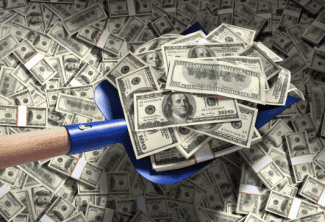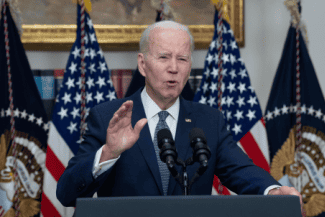How Will Bank Bailout Affect My Mortgage?
by Tara-Nicholle Nelson, Inman News
 Q: My home mortgage is held by a bank that was just bought out, and the bank that bought it has received some of the bailout money.
Q: My home mortgage is held by a bank that was just bought out, and the bank that bought it has received some of the bailout money.
How will the buyout and the bailout impact my mortgage?
A: Despite all the hyperbole in the media, the buyouts and bailouts will not affect the vast majority of homeowners. If you are happy with your mortgage, the biggest impacts you might see are an institutional name change and/or a change in Web site address and mailing address for your mortgage payment. However, if you are struggling with your mortgage, the buyout may have an impact on your situation.
Mindset Management
Many struggling homeowners are disgruntled at the thought of the bailouts, given that there is nothing written into them requiring that the banks pass the help onto their borrowers. Being angry at the government and the banks does nothing to help your situation; rather, those emotions are draining and distracting from your own personal financial issues, so let it go.
Many people who ask this question are waiting for a personal bailout or rescue. Tragically, more than 50 percent of foreclosures occur without the homeowner ever speaking to their lender even once! Do not become part of this statistic — it is up to you to be your own bailout.
The buyout and the bailouts have been effective at creating incentives for lenders to get more serious and effective about negotiating loan modifications with borrowers. If you are struggling with your mortgage and you want to keep your home, don’t ignore your lender’s calls and written notices. In fact, get proactive, pick up the phone and get in touch with your lender’s loss mitigation department.
If you want to and can afford to keep your home, the time and effort you invest might be well worth it.
Need-to-Knows
Let’s demystify what the buyout and bailout are, so you can better understand how they will (or won’t) impact you. The recent bank buyouts occurred when several banks went under — meaning they ran out of money. When this happened, other banks with better cash flow essentially “bought” the assets of the broke bank at a fire-sale price. In this vein, Countrywide was bought out by Bank of America; World Savings was bought by Wachovia; and WaMu was purchased by JP Morgan Chase.
The interesting point for homeowners is that after a buyout, the purchasing institution wants to get as much possible value out of the assets it bought from the bankrupt bank. As such, it often sets to work trying to help borrowers who are behind on their mortgages get current on their loans so they will start making payments again. Also, the purchasing bank usually wants to avoid more of the foreclosures that put the broke bank out of business, so it may target the loans of struggling homeowners for intervention and foreclosure avoidance.
Long story short — lenders vary widely in how committed they are to allowing loan modifications and short sales to occur, but those who have been bought out rank among the most amenable to agreeing to short sales and loan modifications for their borrowers.
The bailout, on the other hand, is that massive chunk of change the federal government appropriated with the intention to buy bad mortgages from banks and keep the banks lending money — not just on mortgages, but on all sorts of consumer and business loans. At the time of this writing, the feds have changed course somewhat, declaring that the bailout funds will not be used to buy bad mortgages. Some bailout money has gone to struggling banks, to help them stay solvent. The majority of those funds, though, are as yet undistributed, and it remains to be seen how they will come into play in resolving the housing crisis, if at all.
One potential indirect impact of the bailout for current homeowners is that with every disbursement of cash from the bailout, the government exhorts lenders to lend more money. This may maintain or even increase the availability of mortgage money to home buyers, with the indirect effect of keeping home values from decreasing any more.
Action Plan
1. Stop waiting for a rescue. If you are struggling with your mortgage, stop waiting for the government to bail you out the way they are bailing industry out. Some government solutions have already been created, but they don’t apply to everyone. More government rescue and housing stimulus packages are likely still to come, but time is not on your side if you are already having trouble keeping up with your mortgage.
2. Get educated about your options. Depending on your lender and your situation, the buyout and the bailout may or may not impact your mortgage. If your mortgage has or is going to adjust, you have lost your job or income, or you are facing foreclosure for whatever reason, there are a number of government- and lender-created options for resolving your situation. Research the solutions that may be available to you, so you can create a plan of attack.
3. Act now. Decide to be your own bailout. Stop ignoring your lenders’ calls or letters, and proactively contact your lender and/or a nonprofit housing counselor to determine your next step.
Tara-Nicholle Nelson is author of “The Savvy Woman’s Homebuying Handbook,” and “Trillion Dollar Women: Use Your Power to Make Buying and Remodeling Decisions.” Ask her a real estate question online or visit her Web site, www.rethinkrealestate.com. What’s your opinion? Leave your comments below or send a letter to the editor. To contact the writer, click the byline at the top of the story.
Copyright 2008 Tara-Nicholle Nelson
See Tara-Nicholle Nelson’s feature, Lease Options: The Good, the Bad, the Ugly.
American Apartment Owners Association offers discounts on products and services related to your commercial housing investment including REAL ESTATE FORMS, tenant debt collection, tenant background checks, insurance and financing. Find out more at www.joinaaoa.org.
To subscribe to our blog, click here.















 Accessibility
Accessibility